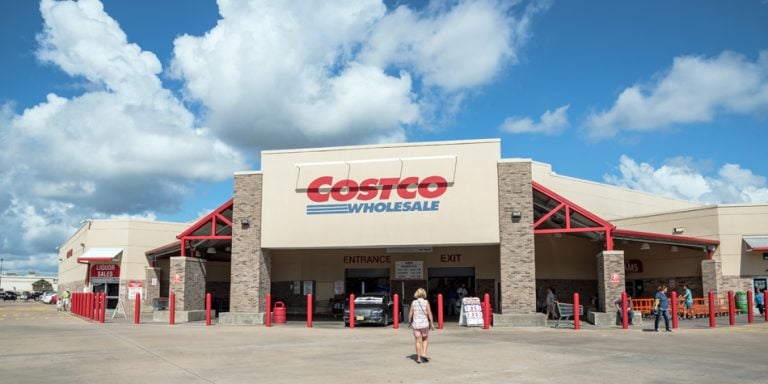Costco (NASDAQ:COST) isn’t a recession-proof company, because no such company exists. To the extent that such a stock can exist, however, COST stock may well be it.
It’s not something that many investors thought they’d be thinking about just a couple of months ago. But the wild market swings suffered since October — mostly bearish — have prompted investors to at least start a serious search for recession-proof names.
It’s also not an idea everyone believes, to be clear. Although the company mostly breezed through the 2008 recession, much has changed in the meantime. Amazon.com (NASDAQ:AMZN) has not only grown greatly since then, food has become big business for the e-commerce giant. Rival Walmart (NYSE:WMT) has stepped up its game as well, after letting operations and customer service get a bit sloppy. Even Target (NYSE:TGT) is more potent.
Nevertheless, by sticking with what’s working (yet also being willing to adapt as needed), Costco quietly remains positioned to be a “best of breed” name should the economy stall.
Mastery of the Annual Fee
Though the business model has been around for far longer, as recently as a decade ago the premise of paying an annual fee to shop with a particular retailer still felt odd.
Costco made it work anyway, even when consumers were feeling squeezed in the throes of the subprime meltdown. Although the company’s top line slumped slightly in fiscal 2009, memberships continued to grow. That growing customer base left Costco well positioned for the recovery that would take shape in 2010, despite some members questioning the benefit of the annual cost of membership at the time.
Then-CEO Jim Sinegal gets credit for the consistency, opting to lower prices on a wide swath of goods rather than tinker with the price of memberships themselves. The company’s chief explained late that year: “We took a very aggressive attitude with our business. We want to make sure the customer recognizes Costco is the place to shop. We’re going to be the low-cost provider of goods. We’re going to reinforce that. We’re going to look for better values, and we’re going to try to present those values to our members on a more consistent basis.”
Since then, the idea of paying a subscription fee for the right to buy from a company has caught on; Amazon’s Prime has fully mainstreamed the premise. Indeed, most everything Costco has done — or still does — has been copied by a rival, one way or another.
It’s not a glaring liability though. As it turns out, more than half of Costco members are also Prime members — an overlap that’s been trending higher for years, as consumers gain comfort with recurring costs. Even to the extent shoppers view club-based retailing in an either/or light, however, the company somehow maintains an edge. Costco recently ended fiscal 2018 with another record-breaking number of paid memberships — 94.3 million in all.
Having already paid a membership fee, those consumers are more likely to swing by a Costco store rather than a Walmart.
New Initiatives
Sinegal is now gone, yet current CEO Craig Jelinek has his finger on the pulse of the environment as well as Sinegal did. And Costco still has multiple paths to more competitiveness despite the fact that club retailing has largely become a commodity.
One new strategy is the company’s rollout of dedicated business centers.
Most Costco shoppers know the company caters to consumers by selling in bulk at ultra-competitive prices. As of the latest tally, however, the company is operating 18 business centers that meet the larger-scale needs of enterprises. More than 70% of goods found in these stores can’t be found in Costco’s typical locale. The stores appear to be a hit that will likely be expanded to new markets.
Another maneuver Costco is making as a means of buoying the value of COST stock: becoming its own supplier.
Costco just announced it would be opening its own chicken farm late next year to help meet the need currently met by the likes of Tyson and Perdue. The Nebraska farm won’t supply all chicken sold in its stores. But it is expected to supply about 100 million chickens per year, meeting roughly 40% of its need and releasing the retailer from the strong pricing power the industry’s biggest suppliers enjoy.
These two efforts will neither make nor break the company. But Costco’s creativity and willingness to tackle seemingly unusual challenges aren’t limited to just these two initiatives. While not as aggressive as its online rival, Costco has quietly ripped several pages out of the Amazon playbook, like doubling down on an already existing private label business.
Bottom Line for COST Stock
COST stock isn’t cheap. Indeed, valued at 27.4 times next year’s projected earnings, Costco stock is notably more expensive than its peers.
It’s also earned more than its fair share of downgrades since September, with the most recent one coming from Citigroup. Analyst Kate McShanea says investors should expect “challenging comps in the coming months at a time when food deflation is coming into play.”
And her point is well taken.
Costco’s gotten pretty good at hitting curve balls though, and has the size and know-how to handle food deflation. Indeed, a company like Costco may well be able to capitalize on that looming deflation, even if it’s caused by a recession. In the meantime, COST stock isn’t a bad name to own in a firm economy.
As of this writing, James Brumley did not hold a position in any of the aforementioned securities. You can follow him on Twitter, at @jbrumley.

